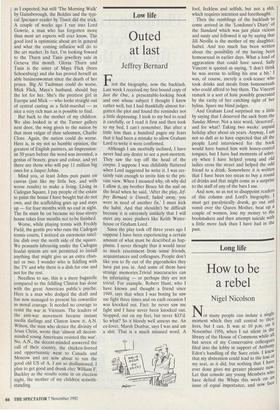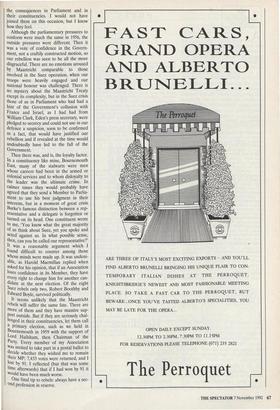Long life
How to be a rebel
Nigel Nicolson
Not many people can isolate a single moment which they call central to their lives, but I can. It was at 10 p.m. on 8 November 1956, when I sat silent in the library of the House of Commons while all but seven of my Conservative colleagues filed into the lobby in support of Anthony Eden's handling of the Suez crisis. I knew that my abstention could lead to the loss of my seat, as it did, but nothing that I have ever done gives me greater pleasure now. Let that console any young Members who have defied the Whips this week on an issue of equal importance, and now face the consequences in Parliament and in their constituencies. I would not have joined them on this occasion, but I know how they feel.
Although the parliamentary pressures to conform were much the same in 1956, the outside pressures were different. Then it was a vote of confidence in the Govern- ment, not a craftily constructed motion, so our rebellion was seen to be all the more disgraceful. There are no emotions aroused by Maastricht comparable to those involved in the Suez operation, when our troops were heavily engaged and our national honour was challenged. There is no mystery about the Maastricht Treaty except its complexity, but in the Suez crisis those of us in Parliament who had had a hint of the Government's collusion with France and Israel, as I had had from William Clark, Eden's press secretary, were pledged to secrecy and could not use in our defence a suspicion, soon to be confirmed as a fact, that would have justified our rebellion and if revealed at the time would undoubtedly have led to the fall of the Government.
Then there was, and is, the loyalty factor. In a constituency like mine, Bournemouth East, many of the stalwarts were men Whose careers had been in the armed or colonial services and to whom disloyalty to the leader was the ultimate crime. In calmer times they would probably have agreed that they send a Member to Parlia- ment to use his best judgment in their interests, but in a moment of great crisis Burke's famous distinction between a rep- resentative and a delegate is forgotten or turned on its head. One constituent wrote to me, 'You know what the great majority of us think about Suez, yet you spoke and acted against us. In what possible sense, then, can you be called our representative?' It was a reasonable argument which I found difficult to counter among those Whose minds were made up. It was undeni- able, as Harold Macmillan replied when asked for his opinion, that if an Association loses confidence in its Member, they have every right to change him for another can- didate at the next election. Of the eight Suez rebels only two, Robert Boothby and Edward Boyle, survived politically. It seems unlikely that the Maastricht rebels will suffer the same fate. There are more of them and they have massive sup- Port outside. But if they are seriously chal- lenged in their constituencies, let them call Primary election, such as we held in Bournemouth in 1959 with the support of Lord Hailsham, then Chairman of the Party. Every member of my Association Was invited to take part in a postal ballot to decide whether they wished me to remain their MP; 7,433 votes were returned, and I lo. st by 91. I reflected (but that was some time afterwards) that if I had won by 91 it would have been much worse.
One final tip to rebels: always have a sec- ond profession in reserve.











































































 Previous page
Previous page